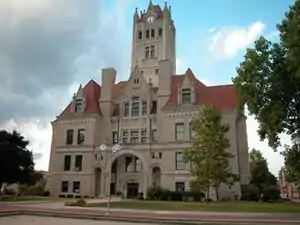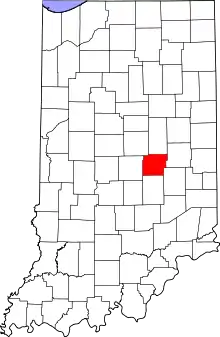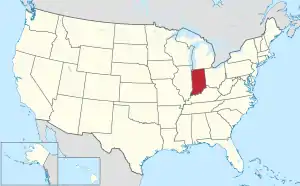Hancock County, Indiana
Hancock County is a county in the U.S. state of Indiana. The 2020 United States Census recorded a population of 79,840.[1] The county seat is Greenfield.[2]
Hancock County | |
|---|---|
 Hancock County courthouse in Greenfield | |
 Location within the U.S. state of Indiana | |
 Indiana's location within the U.S. | |
| Coordinates: 39°49′N 85°46′W | |
| Country | |
| State | |
| Founded | 1 March 1828 |
| Named for | John Hancock |
| Seat | Greenfield |
| Largest city | Greenfield |
| Area | |
| • Total | 307.02 sq mi (795.2 km2) |
| • Land | 306.02 sq mi (792.6 km2) |
| • Water | 1.01 sq mi (2.6 km2) 0.33% |
| Population (2020) | |
| • Total | 79,840 |
| • Density | 260/sq mi (100/km2) |
| Time zone | UTC−5 (Eastern) |
| • Summer (DST) | UTC−4 (EDT) |
| Congressional district | 6th |
| Website | www |
| Indiana county number 30 | |
Hancock County is included in the Indianapolis-Carmel-Anderson, IN Metropolitan Statistical Area
Geography
The terrain of Hancock County is low rolling hills, sloping to the south and southwest, carved by drainages. All available area is devoted to agriculture or urban development.[3] The highest point is a small prominence in NW Shirley, at 1,040 ft (320 m) ASL.[4] According to the 2010 census, the county has a total area of 307.02 square miles (795.2 km2), of which 306.02 square miles (792.6 km2) (or 99.67%) is land and 1.01 square miles (2.6 km2) (or 0.33%) is water.[5]
Adjacent counties
- Madison County - north
- Henry County - east
- Rush County - southeast
- Shelby County - south
- Marion County - west
- Hamilton County - northwest
Major highways
Airport
History
Indiana was admitted as a state to the United States on 11 December 1816, although much of its territory was still disputed or held by native peoples at that time. These indigenous claims were quickly reduced and removed by various treaties. The 1818 Treaty with the Delaware Indians brought most of central Indiana into state control, and Madison County was organized on a portion of that area. The lower portion of Madison County was quickly settled, and by the late 1820s the inhabitants were petitioning for a separate county government. Accordingly, a portion of the county was partitioned on 1 March 1828, to form Hancock County. Greenfield was named as the county seat on 11 April. The county name recognized John Hancock, president of the Continental Congress, who had signed his name prominently to the Declaration of Independence in 1776.[6][7] The county has retained its original borders since its 1828 creation.
Climate and weather
| Greenfield, Indiana | ||||||||||||||||||||||||||||||||||||||||||||||||||||||||||||
|---|---|---|---|---|---|---|---|---|---|---|---|---|---|---|---|---|---|---|---|---|---|---|---|---|---|---|---|---|---|---|---|---|---|---|---|---|---|---|---|---|---|---|---|---|---|---|---|---|---|---|---|---|---|---|---|---|---|---|---|---|
| Climate chart (explanation) | ||||||||||||||||||||||||||||||||||||||||||||||||||||||||||||
| ||||||||||||||||||||||||||||||||||||||||||||||||||||||||||||
| ||||||||||||||||||||||||||||||||||||||||||||||||||||||||||||
In recent years, average temperatures in Greenfield have ranged from a low of 17 °F (−8 °C) in January to a high of 85 °F (29 °C) in July, although a record low of −29 °F (−34 °C) was recorded in January 1985 and a record high of 103 °F (39 °C) was recorded in June 1988. Average monthly precipitation ranged from 2.37 inches (60 mm) in February to 4.85 inches (123 mm) in July.[8]
Government
| Hancock County Sheriff's Department | |
|---|---|
| Jurisdictional structure | |
| Operations jurisdiction | Hancock County, Indiana, Indiana, United States |
| Legal jurisdiction | As per operations jurisdiction |
| General nature | |
| Operational structure | |
| Agency executive |
|
The county government is a constitutional body, and is granted specific powers by the Constitution of Indiana, and by the Indiana Code.
County Council: The legislative branch of the county government; controls the county's spending and revenue collection. Representatives are elected from county districts. The council members serve staggered four-year terms. They are responsible for setting salaries, the annual budget, and special spending. The council also has limited authority to impose local taxes, in the form of an income and property tax that is subject to state level approval, excise taxes, and service taxes.[9][10]
Board of Commissioners: The executive body of the county. The commissioners are elected county-wide, in staggered four-year terms. One commissioner serves as president. The commissioners carry out the acts legislated by the council, collecting revenue, and managing the day-to-day functions of the county government.[9][10]
Court: The county maintains a small claims court that can handle some civil cases. The judge on the court is elected to a term of four years and must be a member of the Indiana Bar Association. The judge is assisted by a constable who is also elected to a four-year term. In some cases, court decisions can be appealed to the state level circuit court.[10]
County Officials: The county has several other elected offices, including sheriff, coroner, auditor, treasurer, recorder, surveyor, and circuit court clerk. They are elected to four-year terms. Members elected to county government positions are required to declare party affiliations and to be residents of the county.[10]
Hancock County is part of Indiana's 5th congressional district; Indiana Senate district 28;[11] and Indiana House of Representatives districts 29 and 53.[12]
| Year | Republican | Democratic | Third party | |||
|---|---|---|---|---|---|---|
| No. | % | No. | % | No. | % | |
| 2020 | 28,996 | 67.40% | 12,895 | 29.97% | 1,129 | 2.62% |
| 2016 | 25,074 | 68.76% | 8,904 | 24.42% | 2,490 | 6.83% |
| 2012 | 22,796 | 69.41% | 9,319 | 28.37% | 728 | 2.22% |
| 2008 | 22,008 | 64.25% | 11,874 | 34.67% | 371 | 1.08% |
| 2004 | 20,771 | 74.54% | 6,912 | 24.80% | 184 | 0.66% |
| 2000 | 15,943 | 69.47% | 6,503 | 28.34% | 504 | 2.20% |
| 1996 | 12,907 | 60.23% | 6,123 | 28.57% | 2,398 | 11.19% |
| 1992 | 11,072 | 53.65% | 4,752 | 23.02% | 4,815 | 23.33% |
| 1988 | 13,374 | 71.21% | 5,355 | 28.51% | 51 | 0.27% |
| 1984 | 12,880 | 73.58% | 4,550 | 25.99% | 74 | 0.42% |
| 1980 | 12,093 | 66.67% | 5,124 | 28.25% | 921 | 5.08% |
| 1976 | 10,072 | 61.31% | 6,191 | 37.69% | 164 | 1.00% |
| 1972 | 11,019 | 77.87% | 3,069 | 21.69% | 62 | 0.44% |
| 1968 | 7,516 | 56.23% | 3,902 | 29.19% | 1,948 | 14.57% |
| 1964 | 6,370 | 49.03% | 6,573 | 50.59% | 50 | 0.38% |
| 1960 | 7,543 | 60.21% | 4,930 | 39.35% | 55 | 0.44% |
| 1956 | 6,962 | 59.93% | 4,600 | 39.60% | 55 | 0.47% |
| 1952 | 6,964 | 59.94% | 4,539 | 39.07% | 116 | 1.00% |
| 1948 | 4,721 | 48.05% | 4,948 | 50.36% | 157 | 1.60% |
| 1944 | 5,139 | 51.71% | 4,652 | 46.81% | 147 | 1.48% |
| 1940 | 5,283 | 48.98% | 5,417 | 50.23% | 85 | 0.79% |
| 1936 | 4,174 | 41.00% | 5,962 | 58.57% | 44 | 0.43% |
| 1932 | 4,055 | 40.22% | 5,836 | 57.89% | 190 | 1.88% |
| 1928 | 4,788 | 56.49% | 3,626 | 42.78% | 62 | 0.73% |
| 1924 | 4,063 | 47.27% | 4,364 | 50.77% | 168 | 1.95% |
| 1920 | 4,422 | 46.16% | 4,958 | 51.76% | 199 | 2.08% |
| 1916 | 2,138 | 41.56% | 2,779 | 54.02% | 227 | 4.41% |
| 1912 | 738 | 14.77% | 2,594 | 51.90% | 1,666 | 33.33% |
| 1908 | 2,472 | 43.50% | 3,040 | 53.49% | 171 | 3.01% |
| 1904 | 2,633 | 46.39% | 2,806 | 49.44% | 237 | 4.18% |
| 1900 | 2,295 | 43.03% | 2,930 | 54.93% | 109 | 2.04% |
| 1896 | 2,236 | 43.22% | 2,886 | 55.79% | 51 | 0.99% |
| 1892 | 1,932 | 42.65% | 2,329 | 51.41% | 269 | 5.94% |
| 1888 | 1,986 | 44.68% | 2,376 | 53.45% | 83 | 1.87% |
Education
Hancock County is served by two library systems, the Fortville-Vernon Township Public Library and Hancock County Public Library.[14]
The county's school districts include:[15]
- Eastern Hancock County Community School Corporation
- Greenfield-Central Community Schools
- Mount Vernon Community School Corporation
- Southern Hancock County Community School Corporation
Demographics
| Census | Pop. | Note | %± |
|---|---|---|---|
| 1830 | 1,436 | — | |
| 1840 | 7,535 | 424.7% | |
| 1850 | 9,698 | 28.7% | |
| 1860 | 12,802 | 32.0% | |
| 1870 | 15,123 | 18.1% | |
| 1880 | 17,123 | 13.2% | |
| 1890 | 17,829 | 4.1% | |
| 1900 | 19,189 | 7.6% | |
| 1910 | 19,030 | −0.8% | |
| 1920 | 17,210 | −9.6% | |
| 1930 | 16,605 | −3.5% | |
| 1940 | 17,302 | 4.2% | |
| 1950 | 20,332 | 17.5% | |
| 1960 | 26,665 | 31.1% | |
| 1970 | 35,096 | 31.6% | |
| 1980 | 43,939 | 25.2% | |
| 1990 | 45,527 | 3.6% | |
| 2000 | 55,391 | 21.7% | |
| 2010 | 70,002 | 26.4% | |
| 2020 | 79,840 | 14.1% | |
| US Decennial Census[16] 1790-1960[17] 1900-1990[18] 1990-2000[19] 2010-2013[20] | |||
2020 census
As of the 2020 United States Census the population of Hancock County was 79,840.[21]
| Race | Num. | Perc. |
|---|---|---|
| White (NH) | 71,106 | 89% |
| Black or African American (NH) | 2,346 | 3% |
| Native American (NH) | 121 | 0.15% |
| Asian (NH) | 734 | 0.9% |
| Pacific Islander (NH) | 42 | 0.05% |
| Other/Mixed (NH) | 3,289 | 4.1% |
| Hispanic or Latino | 2,202 | 2.75% |
2010 Census
As of the 2010 United States Census, there were 70,002 people, 26,304 households, and 19,792 families in the county.[22] The population density was 228.8 inhabitants per square mile (88.3/km2). There were 28,125 housing units at an average density of 91.9 per square mile (35.5/km2).[5] The racial makeup of the county was 95.2% white, 2.1% black or African American, 0.8% Asian, 0.2% American Indian, 0.4% from other races, and 1.2% from two or more races. Those of Hispanic or Latino origin made up 1.7% of the population.[22] In terms of ancestry, 26.2% were German, 13.9% were Irish, 11.8% were English, and 11.8% were American.[23]
Of the 26,304 households, 37.2% had children under the age of 18 living with them, 61.0% were married couples living together, 9.8% had a female householder with no husband present, 24.8% were non-families, and 20.3% of all households were made up of individuals. The average household size was 2.64 and the average family size was 3.03. The median age was 39.1 years.[22]
The median income for a household in the county was $47,697 and the median income for a family was $69,734. Males had a median income of $53,565 versus $38,042 for females. The per capita income for the county was $28,017. About 5.9% of families and 7.3% of the population were below the poverty line, including 8.0% of those under age 18 and 5.2% of those age 65 or over.[24]
Cities and towns
- Cumberland (extends into Marion County)
- Fortville
- Greenfield
- McCordsville
- New Palestine
- Shirley (extends into Henry County)
- Spring Lake
- Wilkinson
Townships
Unincorporated communities
- Carrollton
- Charlottesville (extends into Rush County)
- Cleveland
- Eden
- Finly (also known as Carrollton)
- Gem
- Maxwell
- Milners Corner
- Mohawk
- Mount Comfort
- Nashville
- Philadelphia
- Pleasant Acres
- Riley
- Stringtown
- Warrington
- Westland
- Willow Branch
- Woodbury
See also
- Daily Reporter, daily newspaper covering Hancock County (published in Greenfield)
- Edward E. Moore, Indiana state senator and Los Angeles City Council member
- National Register of Historic Places listings in Hancock County, Indiana
References
- "U.S. Census Bureau QuickFacts: Hancock County, Indiana; Hamilton County, Indiana; Hamilton County, Florida; United States". www.census.gov. U.S. Census Bureau. Retrieved July 27, 2022.
- "Find a County". National Association of Counties. Retrieved June 7, 2011.
- "Hancock County IN" (Google Maps - accessed 27 December 2019)
- "Hancock County IN" (peakbagger.com - accessed 27 December 2019)
- "Population, Housing Units, Area, and Density: 2010 - County". US Census Bureau. Archived from the original on February 12, 2020. Retrieved July 10, 2015.
- De Witt Clinton Goodrich & Charles Richard Tuttle (1875). An Illustrated History of the State of Indiana. Indiana: R. S. Peale & co. pp. 561.
- Gannett, Henry (1905). The Origin of Certain Place Names in the United States. Govt. Print. Off. p. 148.
- "Monthly Averages for Greenfield IN". The Weather Channel. Retrieved January 27, 2011.
- Indiana Code. "Title 36, Article 2, Section 3". IN.gov. Retrieved September 16, 2008.
- Indiana Code. "Title 2, Article 10, Section 2" (PDF). IN.gov. Retrieved September 16, 2008.
- "Indiana Senate Districts". State of Indiana. Retrieved July 14, 2011.
- "Indiana House Districts". State of Indiana. Retrieved July 14, 2011.
- Leip, David. "Atlas of US Presidential Elections". uselectionatlas.org. Retrieved May 17, 2018.
- "Indiana public library directory" (PDF). Indiana State Library. Retrieved March 7, 2018.
- ""2020 CENSUS - SCHOOL DISTRICT REFERENCE MAP: Hancock County, IN" (PDF)" (PDF). U.S. Census Bureau. Retrieved July 25, 2022.
- "US Decennial Census". US Census Bureau. Retrieved July 10, 2014.
- "Historical Census Browser". University of Virginia Library. Retrieved July 10, 2014.
- "Population of Counties by Decennial Census: 1900 to 1990". US Census Bureau. Retrieved July 10, 2014.
- "Census 2000 PHC-T-4. Ranking Tables for Counties: 1990 and 2000" (PDF). US Census Bureau. Retrieved July 10, 2014.
- "Hancock County QuickFacts". US Census Bureau. Archived from the original on June 7, 2011. Retrieved September 17, 2011.
- "P2 HISPANIC OR LATINO, AND NOT HISPANIC OR LATINO BY RACE – 2020: DEC Redistricting Data (PL 94-171) – Hancock County, Indiana".
- "Profile of General Population and Housing Characteristics: 2010 Demographic Profile Data". US Census Bureau. Archived from the original on February 13, 2020. Retrieved July 10, 2015.
- "Selected Social Characteristics in the US – 2006-2010 American Community Survey 5-Year Estimates". US Census Bureau. Archived from the original on February 14, 2020. Retrieved July 10, 2015.
- "Selected Economic Characteristics – 2006-2010 American Community Survey 5-Year Estimates". US Census Bureau. Archived from the original on February 14, 2020. Retrieved July 10, 2015.
